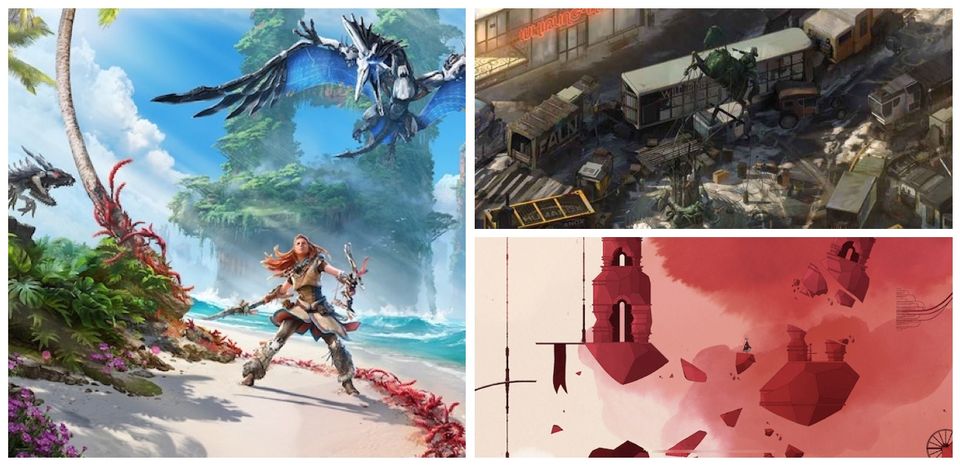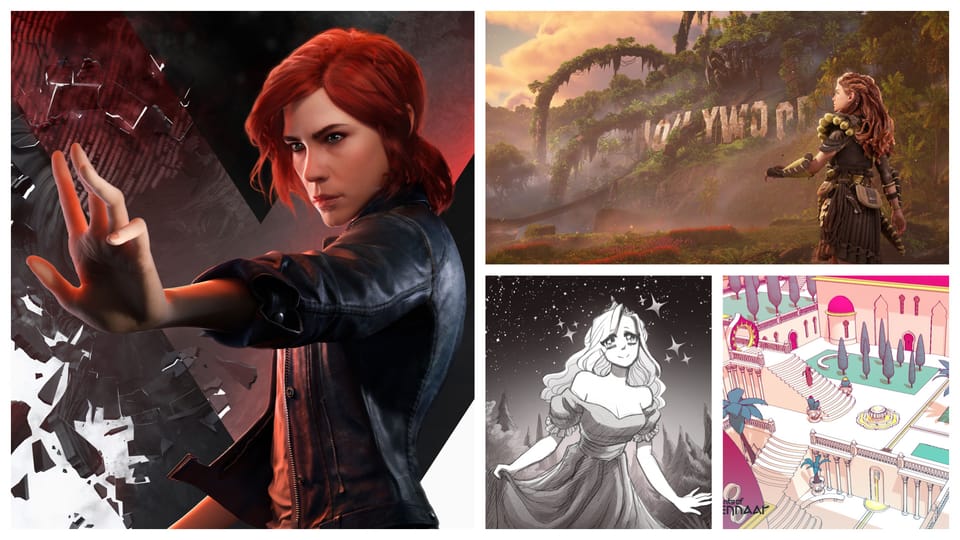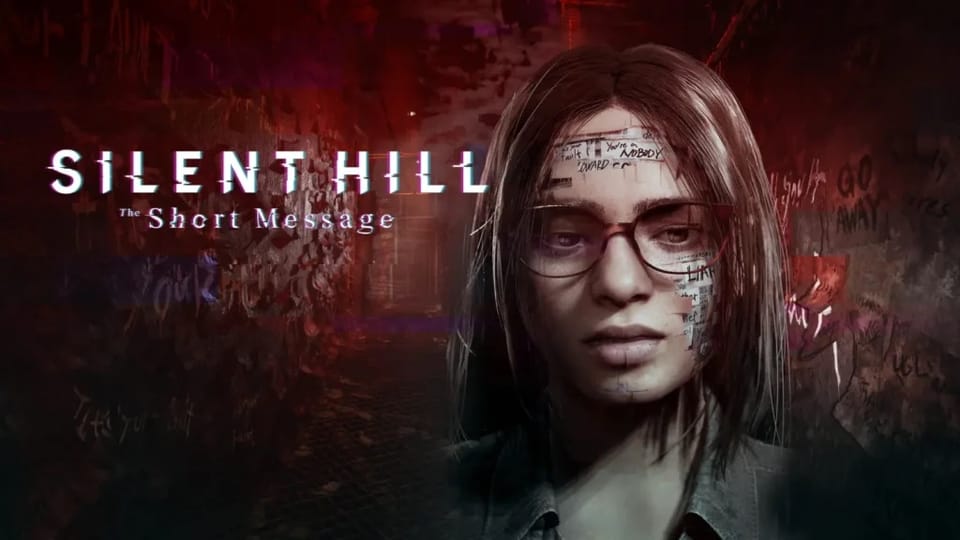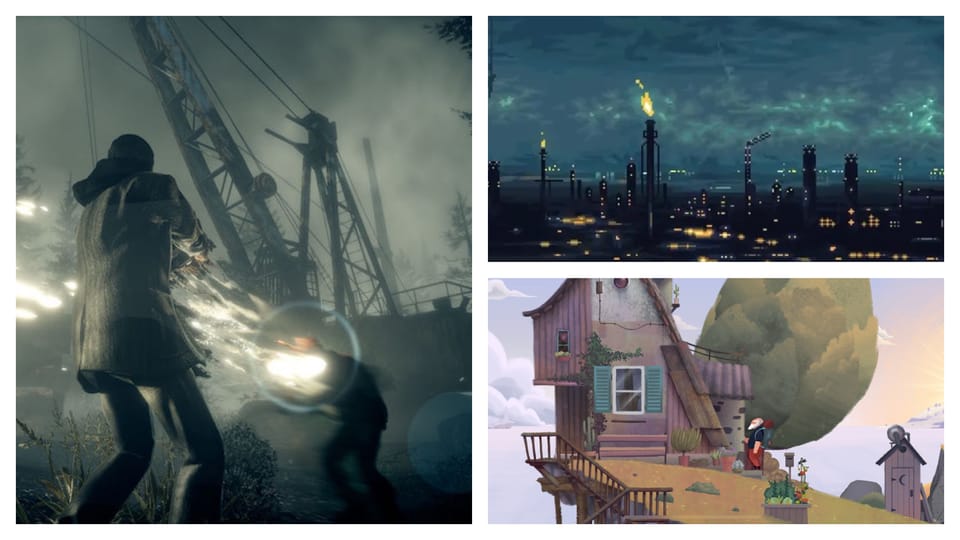Over the past year or so, I've been trying to reach outside of my comfort zone and play a greater of variety of games. In addition to my usual RPG, puzzle platformer, and adventure games, this year, I also dipped my toes into the roguelike, community management, and simulation genres. Expanding in this way has led to some amazing discoveries in terms of gameplay and the ways in which games can tell stories — and I've found some new favorites along the way.
As of writing this, there are a couple of games I'm currently playing that might have made the list, if I was closer to completion, including Somerville and 2018's God of War. They may just end up on next year's list.
Hades
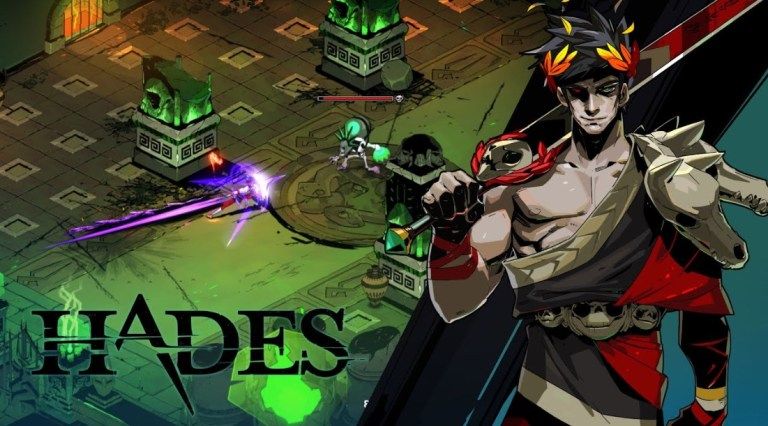
In Hades (2018), Zagreus, the son of Hades, is determined to escape the underworld and discover the truth about his mother. In order to do so, however, he must ascend through the levels of hell in order to reach the surface world. Along the way he runs into the other gods and monsters of Greek myth, who decide to either help or hinder him according to their own whims.
Hades is not the kind of game I’d ever thought I’d play, since it falls into the punishing roguelike genre (or a roguelite, I guess? the distinction between the two seems a fine line to me). In this type of game, the player generally enters various dungeons and fights a slew of enemies, hacking through them — until meeting their death, which sends them back to the beginning to start the process all over again. Dying is an essential element of the gameplay — and a recipe for frustration, if I've ever seen one.
And yet, I loved playing Hades, which is largely due to several aspects of its excellent overall game design. First, each time the player dies, they are able to level up their character's attributes, enabling them to return stronger each time. This is apparently a common aspect of roguelike games, and it is handled well in Hades, providing the player with multiple ways of managing combat according to their own individual play style.
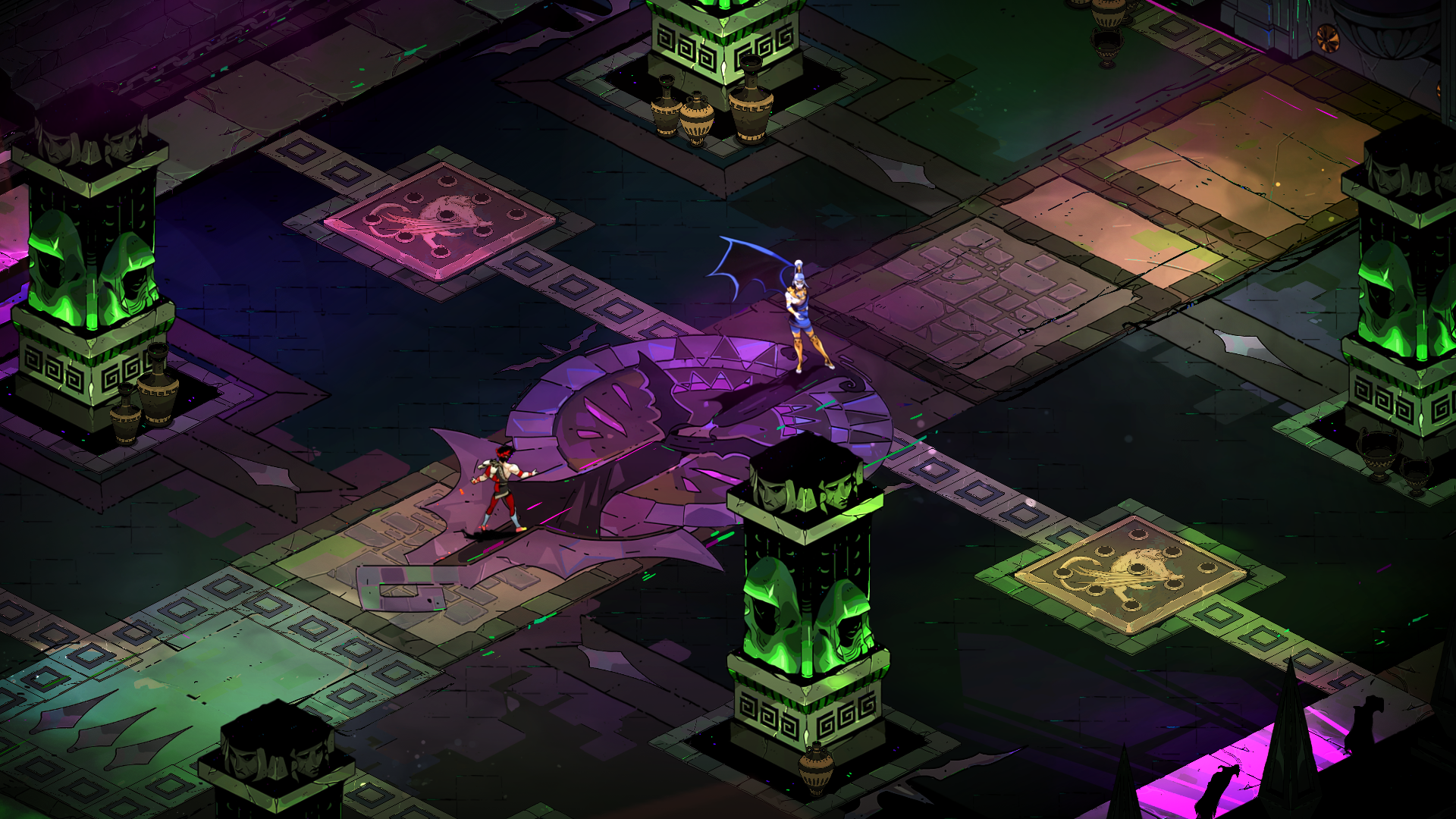
Second — and this is the real kicker for me — with each death, the game rewards the player by using it as an opportunity to expand the storyline. When Zagreus lands back in the underworld, he can speak with his father, various spirits, and other characters. These interactions allows us to learn more about this world and its interesting array of characters. These interactions also change depending on well he does in the dungeons. For example, a boss character that was defeated, may express feelings of bitterness when Zagreus returns.
With its clever incorporation of story and character into the structure of the game, Hades transforms the constant repetition of dying from frustrating to satisfying. I found myself almost looking forward each death, just so I could run around and talk to the various characters.
Admittedly, I still need to finish Hades — but even so, I'm in love with this game, and I can't wait for the sequel.
Horizon II: Forbidden West
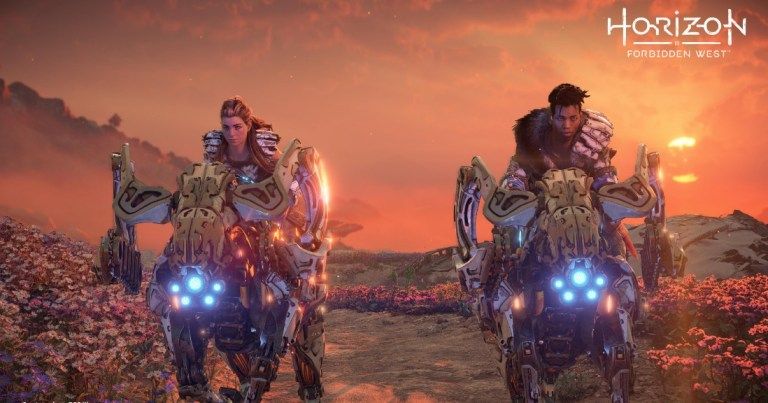
Launched in early 2022, Forbidden West (the sequel to Horizon: Zero Dawn) got a bit overshadowed by other major games also released last year. Nevertheless, the game deserved recognition for its beautifully expansive open world, excellent combat with a variety of weapons and traps, and strong characters and storyline.
Following after the events of the previous game, Aloy has come to realize HADES, the computer program that threatened to destroy all life on Earth, may not have been fully defeated after all. Her quest to hunt HADES down forces her to travel deep into the Forbidden West, an area known for its dangerous tribes and deadly machines. But as new enemies arise, the danger turns out to be so much greater than she could have imagined.
Forbidden West expands the world and gameplay, building on the existing mechanics and puzzles, while adding some new ones (most notably the ability to ride a pterodactyl-like flying machine). However, the element I loved the most was being about to bring a community together. In the first game, Aloy was always alone and, having been an outcast throughout her youth, shunned the help of others. In the sequel, she learns that she doesn't have to face the dangers of the world alone, and it's beautiful seeing her make connections with friends and learning to accept help.
With expanded content coming out in 2023, I'm looking forward to returning to this world and its characters.
Disco Elysium: The Final Cut
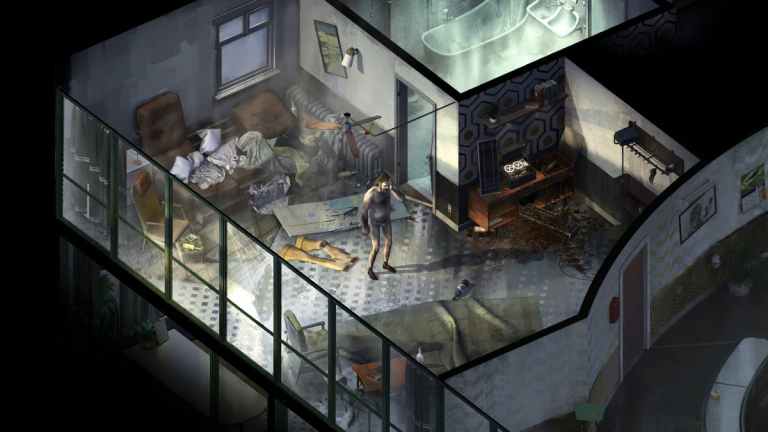
Disco Elysium: The Final Cut, released in 2019, is an RPG adventure game, in which you play a haggard detective, who wakes after a night of heavy drinking with no memory of his past or why he's there in a torn up hotel room. It's not until you start asking around that the player discovers they are a detective, who is in Martinaise, a decaying seaside town in the fictional country of Revachol, to investigate a murder. With the help of your partner, the wonderful Kim Kitsuragi, the player explores the town, trying to draw out the truth in the face of poverty, bureaucracy, and a union strike — among other challenges.
My initial experience of playing this game was like diving into particularly dense poetry. At first, everything is a bit overwhelming, the images and metaphors and rich language flowing so quickly that it's difficult to keep up. Each aspect of the detective's personality is granted its own stunningly acted voice, evoking a sense of disassociation and drawing attention to the character's depression, alcoholism, drug problems, and other issues. It takes a bit of time to settle into the flow of imagery, but once I did I was completely absorbed by this game and its complex branching storyline, which allows for a multitude of possibilities.
Although, a murder mystery lies at the heart of this story, it almost seems beside the point. The journey is the purpose, the randomness of exploring this society and meetings its array of characters providing the possibility of the mystical just at the edges of the dull, dry world. For me, the experience was almost magical — and I'm interested in playing again, making other choices, and seeing what other pathways this story might carry me down.
The Cult of the Lamb
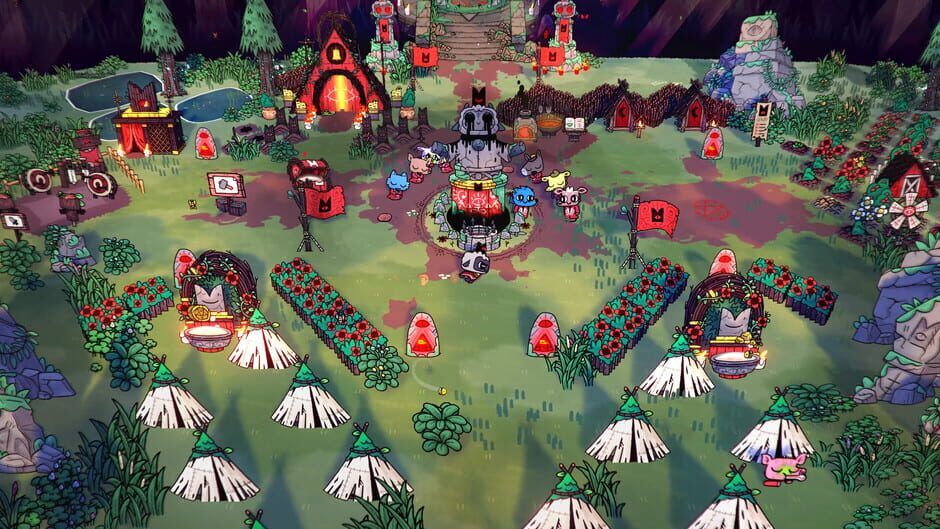
The Cult of the Lamb is a charming game with a folksy goth aesthetic. You play as a cute little lamb, who is about to be sacrificed by a quartet of bishops — only to be saved by The One Who Waits, an ancient god chained within an under realm. The god promises to give you knew life, as long as you vow to start a cult in his name and gather followers with the purpose of setting him free.
The gameplay involves two main elements — building a community of followers and delving into dungeons to defeat monstrous enemies and gather supplies. The community building aspect includes gathering followers and keeping them happy by holding religious services (from fire dances to sacrificing followers), mining for resources, and constructing homes, decorations, and other structures.
The combat is roguelike in that you enter dungeons and face increasing swarms of enemies with a high chance of death. Each time you go through the dungeons, you have the opportunity to gather gold and supplies that help you build your community and increase the strength of your character. The combat isn't quite as smooth or satisfying as it is in Hades; however, this is balanced out by the way each element comes together to create a complete experience, which also includes one of my all-time favorite mini-games — a dice game called Rattlebones. (I may even try to recreate this dice game with friends in real life.)
Gris
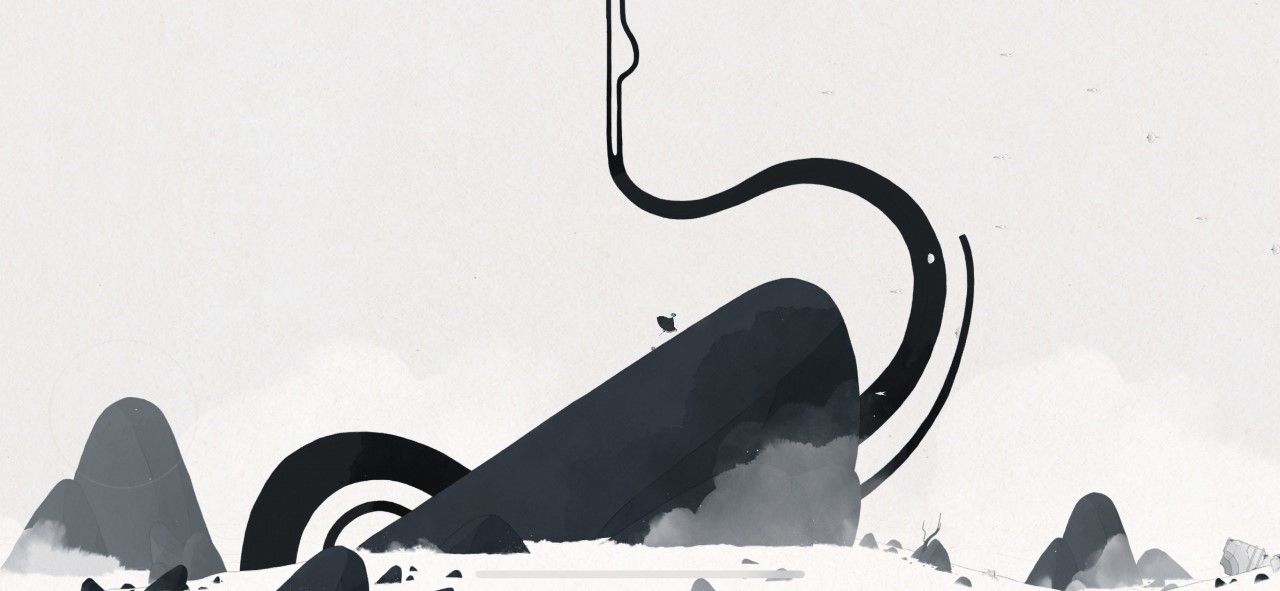
First published in 2018, Gris is a gorgeous puzzle-platforming game about a woman traveling through a bleak, grey world. The game presents a pleasant blending of simple platforming and puzzles, making for a shorter completion time of only a few hours (depending on how much time the puzzles take). With its beautiful watercolor and ink-based artwork and silent story evoked through puzzles, world building, music, and stunning animations, Gris is an emotionally impactful game, exploring issues of depression, anxiety, and sorrow. After finishing, I just let myself fall into a moment of silence to fully appreciate what I had experienced.
Mini Motorways
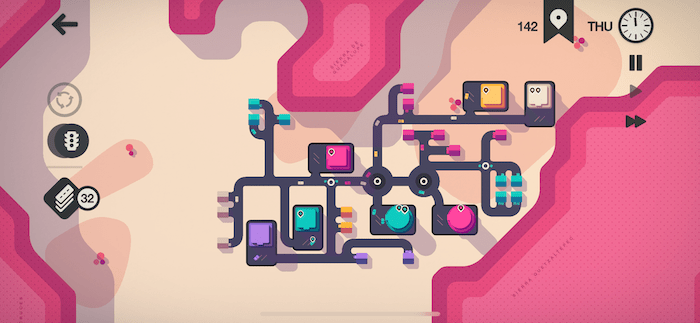
Mini Motorways (2019) is a strategy, city building game, which involves constructing roadways, bridges, and freeways in order to connect drivers from their homes to their destination. As the days pass within the game world and new buildings pop up in increasingly inconvenient places, the city and its roadways grow in complexity until the cars inevitably become too jammed up by traffic, causing the city to grind to a halt.
While there is no story in this game, the puzzle of trying to figure out a strategy for each city is deeply satisfying and addictive. Each level is based on a real-world city, presenting different landscape challenges to address, from waterways to cross or mountains to tunnel under. There are also weekly and daily challenges that provide additional limitations or boons, forcing the player to think around the problem in different ways. I lost hours of time to Mini Motorways, and I loved every second of it.
